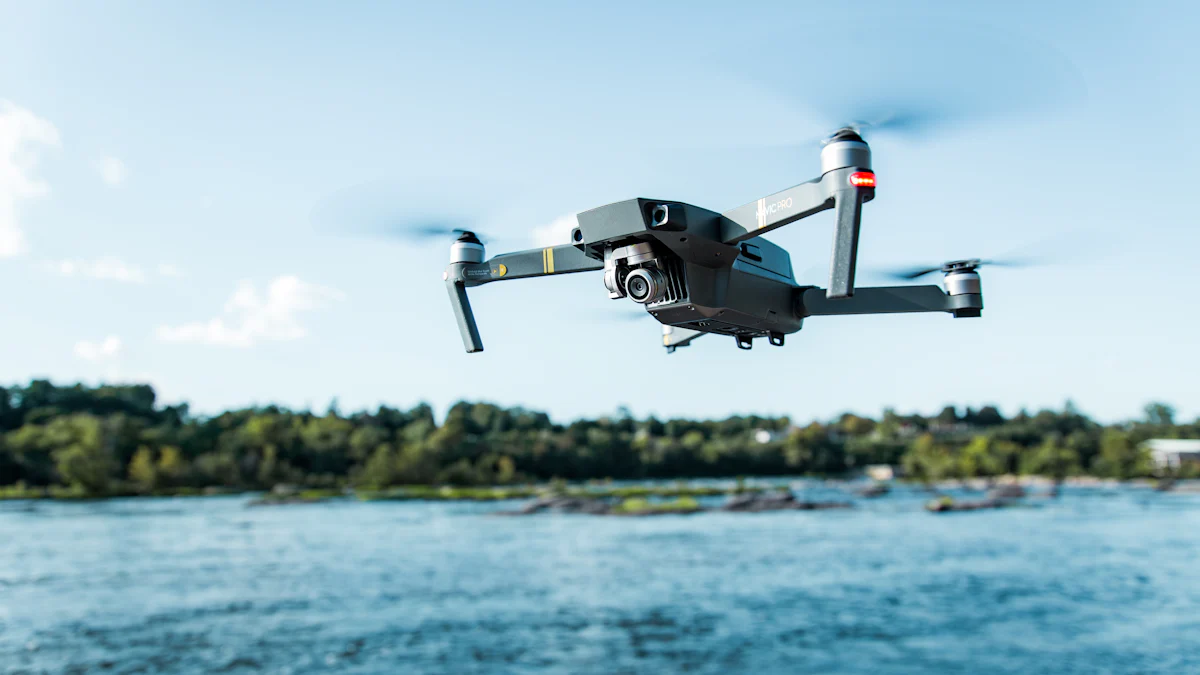Choosing the Best Thermal Camera Drone: Price and Features Comparison

Exploring the World of Thermal Camera Drones
Thermal camera drones have revolutionized the way we capture and interpret visual data. These advanced devices are equipped with thermal imaging technology, allowing users to detect and visualize heat signatures in various environments. In this section, we will delve into the fundamentals of thermal imaging in drones and explore the rise of FPV thermal camera drones.
Introduction to Thermal Imaging in Drones
How Thermal Cameras Work
Thermal cameras operate by detecting the heat emitted by objects and converting it into a visible image. Unlike traditional cameras that rely on visible light, thermal cameras can capture images in complete darkness or through obstructions such as smoke or fog.
Applications of Thermal Camera Drones
The applications of thermal camera drones are diverse and impactful. They are widely used in search and rescue operations to locate missing persons by detecting their body heat signatures. Additionally, these drones are employed for wildlife monitoring, infrastructure inspections, and even agricultural assessments.
The Rise of FPV Thermal Camera Drones
What Makes FPV Drones Unique?
FPV (First Person View) thermal camera drones offer an immersive flying experience, allowing operators to view real-time thermal imagery from an onboard camera. This unique perspective enables precise navigation through challenging environments while capturing high-quality thermal data.
The Advantages of FPV for Thermal Imaging
FPV technology enhances situational awareness by providing live feedback to the operator, making it ideal for surveillance missions and emergency response scenarios. Moreover, the ability to stream thermal footage directly to a compatible device empowers users with immediate insights into temperature differentials across landscapes.
Key Features to Look for When You Buy Drone with Thermal Camera
As you venture into the world of thermal camera drones, it's essential to understand the key features that distinguish one model from another. When considering a thermal camera drone purchase, several crucial factors come into play, including resolution, sensitivity, flight time, durability, and compatibility with the iSun analog FPV thermal camera.
Understanding Resolution and Sensitivity
The Role of Resolution in Thermal Imaging
The resolution of a thermal camera determines the level of detail and clarity in the captured thermal images. Higher resolution cameras provide sharper and more precise thermal data, enabling better analysis and interpretation of heat signatures across different environments. When looking to buy a drone with a thermal camera, it's important to prioritize models with higher resolution capabilities for enhanced imaging quality.
Sensitivity: Why It Matters
Sensitivity refers to a thermal camera's ability to detect minimal temperature differences accurately. Drones equipped with highly sensitive thermal cameras can identify subtle variations in heat patterns, making them invaluable for applications such as wildlife monitoring and search and rescue missions. As you evaluate options to buy drones with thermal cameras, prioritizing high sensitivity ensures reliable performance in diverse scenarios.
The Importance of Flight Time and Durability
Maximizing Your Flight Time
When investing in a drone with a thermal camera, considering the flight time is crucial. Longer flight times allow for extended aerial surveillance or data collection sessions without frequent battery changes or recharges. Look for drones that offer optimal battery life and efficient power management systems to maximize your operational window.
Durability in Harsh Conditions
Drones are often deployed in challenging environmental conditions, including extreme temperatures and unpredictable weather patterns. Therefore, durability is a critical factor when seeking to buy a drone with a thermal camera. Robust construction materials and weather-resistant design elements ensure that your drone can withstand demanding operational environments while maintaining consistent performance.
Compatibility with iSun Analog FPV Thermal Camera
Why Choose iSun?
The iSun analog FPV thermal camera stands out as an exceptional choice for drone operators seeking reliable thermal imaging solutions. With its advanced technology and seamless integration capabilities, iSun offers high-quality thermal imaging performance suitable for various applications, ranging from security surveillance to industrial inspections.
Integrating iSun with Your Drone
When assessing options to buy drones with thermal cameras, ensuring compatibility with the iSun analog FPV thermal camera opens up opportunities for expanded functionality and versatility. Integration with iSun empowers users to leverage its cutting-edge features while harnessing the benefits of first-person view (FPV) technology for immersive aerial experiences.
By prioritizing these key features when evaluating potential purchases of drones equipped with thermal cameras, you can make informed decisions that align with your specific operational requirements.
Top Picks: FPV Thermal Camera Drones Comparison
As you embark on the journey to select the ideal FPV thermal camera drone, it's essential to explore a range of options that cater to diverse user requirements. From entry-level choices to high-end models, each drone offers unique features and capabilities, allowing enthusiasts and professionals alike to find the perfect match for their aerial imaging needs.
Entry-Level Options
Drone A: Features and Price
Drone A presents an excellent entry point into the world of FPV thermal imaging. Equipped with a compact yet powerful FPV thermal camera, this drone boasts intuitive controls and stable flight performance, making it an ideal choice for beginners and hobbyists. With a focus on user-friendly operation and affordability, Drone A provides a reliable platform for capturing thermal imagery in various scenarios.
Drone B: Features and Price
For those seeking an affordable yet feature-rich FPV thermal camera drone, Drone B emerges as a compelling option. This entry-level model combines advanced thermal imaging technology with user-friendly design elements, offering an immersive aerial experience at a competitive price point. With its emphasis on accessibility and functionality, Drone B caters to users looking to explore the capabilities of thermal imaging without breaking the bank.
Mid-Range Choices
Drone C: Features and Price
Drone C represents a significant step up in terms of performance and versatility within the mid-range segment of FPV thermal camera drones. Boasting enhanced FPV capabilities and advanced thermal imaging features, this drone is well-suited for enthusiasts and professionals seeking comprehensive aerial imaging solutions. With extended flight times and refined control systems, Drone C delivers exceptional value for users looking to elevate their thermal imaging endeavors.
Drone D: Features and Price
In the realm of mid-range FPV thermal camera drones, Drone D stands out as a formidable contender. Designed to meet the demands of diverse applications, this drone integrates cutting-edge thermal technology with robust construction for reliable performance in challenging environments. With its focus on durability and adaptability, Drone D empowers users with enhanced aerial imaging capabilities while maintaining an accessible price point.
High-End Models
Drone E: Features and Price
At the pinnacle of FPV thermal camera innovation lies Drone E, a high-end model that redefines aerial imaging standards. Featuring state-of-the-art FPV technology paired with industry-leading thermal imaging capabilities, this drone sets new benchmarks for precision and performance. With advanced flight dynamics and unparalleled image quality, Drone E caters to professionals seeking uncompromising excellence in their thermal imaging pursuits.
Drone F: Features and Price
Drone F epitomizes luxury in the realm of high-end FPV thermal camera drones, offering an array of sophisticated features tailored for discerning users. From advanced flight autonomy systems to ultra-high-resolution thermal sensors, this drone embodies cutting-edge innovation in both aerial maneuverability and thermal data capture. As a premium choice for professional applications, Drone F represents the pinnacle of FPV thermal camera technology.
Making the Right Choice: Price vs. Performance
As you navigate the landscape of thermal camera drones, striking a balance between price and performance is crucial in making an informed purchasing decision. This section will guide you through the considerations of budget alignment with operational needs and shed light on long-term factors to evaluate when investing in a drone with thermal imaging capabilities.
Balancing Budget and Needs
When to Save and When to Splurge
When evaluating options for thermal camera drones, it's essential to assess your specific operational requirements against the available budget. For enthusiasts and hobbyists, entry-level and mid-range models offer a cost-effective entry point into thermal imaging without compromising essential features. However, professionals engaging in specialized applications such as search and rescue missions or industrial inspections may find value in investing in high-end models equipped with advanced thermal imaging technology. Understanding when to save on features that align with your immediate needs versus when to splurge on cutting-edge capabilities ensures that your investment optimally serves its intended purpose.
Hidden Costs to Consider
Beyond the initial purchase price of a drone with thermal camera capabilities, it's imperative to account for hidden costs that may arise during ownership. These hidden costs encompass accessories such as additional batteries, storage solutions for captured data, and maintenance tools required to uphold the drone's optimal performance. Furthermore, training programs or certifications for operating thermal camera drones professionally should be factored into the overall cost analysis. By proactively identifying these hidden costs, you can make well-informed decisions that encompass the full spectrum of financial considerations associated with owning a thermal imaging-equipped drone.
Long-Term Considerations
Maintenance and Upgrades
As you integrate a drone with thermal imaging capabilities into your operational workflows, prioritizing maintenance and potential upgrades is integral to sustaining its longevity and performance. Regular maintenance routines, including cleaning components and inspecting for wear or damage, contribute to prolonging the lifespan of your drone while ensuring consistent image quality from the thermal camera system. Additionally, staying informed about available upgrades for firmware or hardware components enables you to adapt your drone's capabilities in line with evolving industry standards and technological advancements.
Resale Value and Upgradability
Considering the resale value and upgradability of a drone with thermal imaging features is paramount for long-term planning. High-quality drones equipped with sought-after thermal imaging capabilities often retain significant resale value within the market. This aspect not only safeguards your initial investment but also presents opportunities for upgrading to newer models without bearing the full cost burden. Assessing a drone's upgradability potential by examining compatibility with future enhancements or accessories empowers you to future-proof your investment while embracing emerging advancements in thermal imaging technology.
By navigating the interplay between price considerations and performance expectations alongside long-term perspectives on maintenance, upgrades, resale value, and upgradability, you can confidently select a drone equipped with thermal imaging capabilities that aligns harmoniously with both your immediate needs and future aspirations.
Final Thoughts
As we conclude our exploration of choosing the best thermal camera drone, it's essential to recap the key points and provide a personal recommendation based on my experience with FPV thermal camera drones.
Recap of Key Points
Throughout this guide, we've delved into the fundamental aspects of thermal imaging in drones, emphasizing the rise of FPV thermal camera drones and their unique advantages. We've also highlighted the key features to consider when purchasing a drone with thermal camera capabilities, ranging from resolution and sensitivity to flight time, durability, and compatibility with the iSun analog FPV thermal camera. Additionally, we've compared top picks across entry-level, mid-range, and high-end models to cater to diverse user requirements.
Personal Recommendation
My Experience with FPV Thermal Camera Drones
Having extensively utilized FPV thermal camera drones in various scenarios, I can attest to their transformative impact on aerial imaging applications. The immersive experience offered by FPV technology coupled with real-time thermal imagery has significantly enhanced situational awareness and data collection efficiency. Whether navigating through challenging environments for wildlife monitoring or conducting precision inspections in industrial settings, the integration of FPV thermal cameras has consistently elevated operational outcomes.
Final Advice for Buyers
In closing, my final advice for buyers seeking a drone equipped with FPV thermal camera capabilities is to prioritize a model that aligns closely with their specific operational needs. Consider factors such as resolution, sensitivity, flight time, and durability in relation to your intended applications. Moreover, explore the potential for integrating compatible accessories such as the iSun analog FPV thermal camera to expand functionality and versatility. By making an informed decision that balances price considerations with performance expectations while accounting for long-term maintenance and upgradability prospects, you can confidently embark on your aerial imaging endeavors.
See Also
Selecting the Top Thermal Imaging Camera for FPV Drone
Picking the Finest Drone Thermal Camera for Aerial Thermography
2024 Ultimate Price Guide for Thermal Imaging Drone Cameras
Contact Us: Ms. Coco Huang
E-mail: sales@iasun.cn
WhatsApp/Wechat: +86 13510421923

